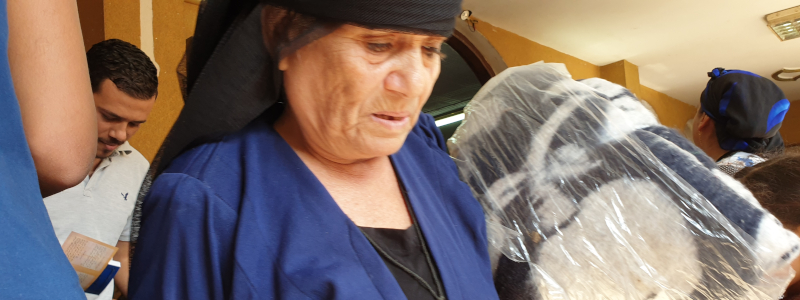A widow in Egypt was in tears when she called a local ministry leader with word that she had lost her job as a housecleaner due to a coronavirus lockdown.
Maria* was supporting seven family members, including a daughter with two infants who was separated from her drug-addicted husband and a married son with two children who had lost his job and home due to the pandemic.
“She was crying while telling us that she had to sell her kitchen appliances in order to meet some of their basic needs,” the ministry leader said.
Living on her late husband’s pension of 360 Egyptian pounds ($22.50) per month, Maria asked how she would cover her family’s needs. She said she also had a heart condition requiring monthly medication for life.
“Their salaries were already not enough to meet their basic needs and have a decent life, and now they don’t have any source of income at all.”
“She occupies our minds day and night as we strive to think about how to help this deprived family,” the ministry leader said.
Providing counseling and other services to women, local missionaries have forged longstanding relationships with them. Now they have committed to financially supporting Maria and other women, including many widows, with monthly payments to help with rent, bills, and other obligations, along with providing some medications.
Local missionaries also help women like Maria with monthly food and basic supplies for infants, but like the other expenses, the needs far outstrip the ministry’s resources.
“We stand helplessly towards her questions on how she will cover all her family’s needs,” the leader said.
Continuous Contact
Many widowed women in Egypt have lost their jobs to the pandemic and have no other sources of income, as the government has also suspended disbursement of pensions due to the crowds that gather at official offices, the leader said.
“So most of them are now without a fixed monthly income and without a fixed pension,” he said. “Some women were infected with the coronavirus, and some of them lost a family member because of the virus.”
Local missionaries maintain constant contact with women infected with the novel coronavirus, communicating with them continuously to ask about their condition and their families. Workers then call doctors for advice and medication.
Some of the women they’re serving have lost family members to COVID-19, he said. The virus has affected all the women the ministry was serving; most of them lost their jobs, especially those working as maids, nannies in nurseries, or hairdressers.
“All of a sudden, they found themselves with no source of income, and they are responsible for their families and children beside their responsibilities to pay rent, electricity bills, water bills, and other monthly expenses,” the leader said. “Their salaries were already not enough to meet their basic needs and have a decent life, and now they don’t have any source of income at all. And this was a great challenge for us to be able to support those widows and their children during these challenging times.”
The ministry requests prayer for a team member whose father died from COVID‐19, while her mother is recovering from the disease.
“We ask God for her to be fully cured,” he said. “We believe as a team that God is in control of all matters we are going through, and we are experiencing His care, protection, love and blessings.”
Committing to help the women overcome distress since the beginning of the pandemic, local missionaries are standing with them and their children to help them trust in the Lord, praying for Him to care for them and help them trust that He is able to meet all their needs whatever the circumstances, the director said.
“We are keen to deliver a message of reassurance and encouragement to each woman separately to believe in God, that He sees all the sufferings she is going through, and He who was with her in the past and helped her to pass through it all is still there and still works in her life,” he said.
Replacing Face Time
The novel coronavirus spread early and widely in Egypt, leading the government to prevent the kinds of spiritual gatherings that the women depended on, he said.
Personal, face-to-face contact is important to any ministry and is integral to Middle Eastern culture. Faced with the challenges of continuing to meet the women’s urgent needs for spiritual, psychological, medical and financial help, the ministry has created WhatsApp groups for women and children through which they support them spiritually by making prayer times and sharing sermons and songs, the leader said.
“We are facing a great challenge to come alongside the widows and their children in this difficult time, but we were so happy at their eagerness to interact with all of us during the prayer times on the group,” he said. “And for those who cannot read or write, they were keen to pray through voice notes which they share with us, and they were all praying to the Lord asking Him to end this pandemic.”
Local missionaries said they have noted how sharing prayers in this way has boosted the morale of the women.
“Thank God! This group has become the only source for them to pray and share all that they are passing through during this time,” he said.
Local missionaries throughout the country seek assistance for these women and others in need as COVID-19 leaves devastation in its wake. Please consider a donation today to equip workers to help the poor overcome disaster in Christ’s name.
*Name changed for security reasons

